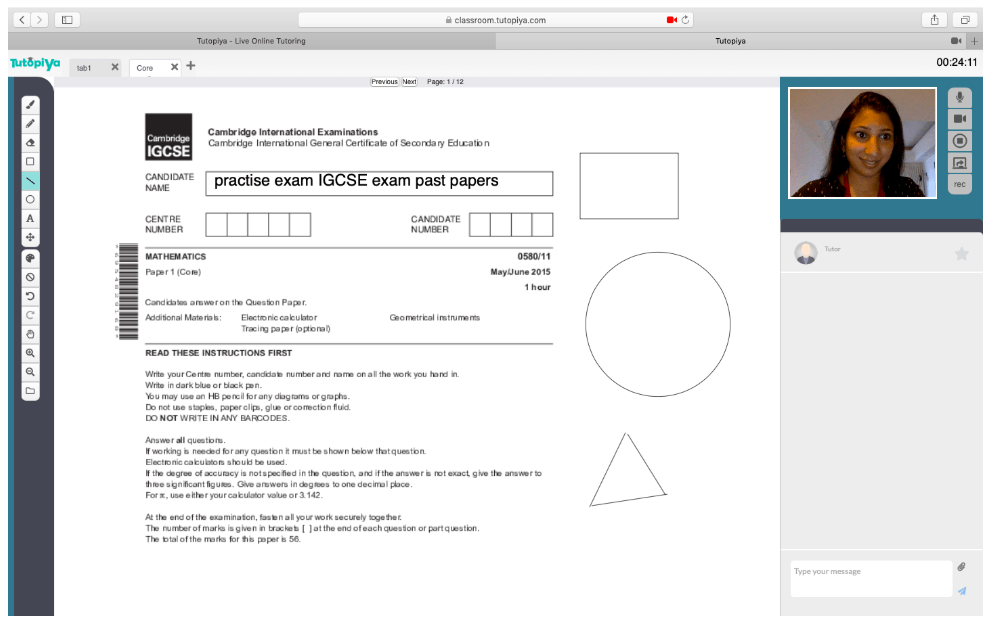As a parent, have you been struggling to understand and differentiate between Live Online Learning and E-Learning and which will benefit your child better?
We wanted to make this easier for you.
We are here to break down the differences between online learning & e-learning.
Specifically live online learning, as this provides the 1-1 student & teacher interaction in real-time online.
We also have a video demonstration that can be found in the body of this article on how live online learning works so you can get a glimpse of the interface and how it works,
Understanding the Differences: Live Online Learning vs E-learning
Many parents have the common misconception that E-Learning (Home-Based Learning) conducted by schools is the same as receiving Live Online Learning Tuition/Classes.
But they are not.
There are many differences that separate these two learning styles.
We will explore four main points to help you understand and differentiate between live online learning vs e-learning.
The aim of this article is to help you understand the difference between E-Learning and Live Online Learning, and not to compare between these two.
The 4 areas that we will consider in this article as the following:
- How they work?
- Interactiveness
- Personalization
- Guidance
We also have an infographic at the end that visualizes the differences if any of you would like to skip to that right away.
How They Work?
E-Learning
E-Learning, also known as Home-Based Learning is to learn from home with the aid of an online portal that students have access to.
Example – Blackboard
Students have to log into their respective accounts and complete any work that is due for the day or week.
E-Learning usually contains materials for students to go through themselves, therefore it is very independent.
These materials are either soft copy materials (eg. worksheets/lecture notes/PowerPoint slides.) or/and video explanation of the lecture/class.
It would be followed by a series of quizzes, tests, homework and assignments.

Live Online Learning
As the word ‘online’ suggests, live online learning happens just like normal learning but entirely online.
Lessons are conducted at the comfort of the student’s homes, except the student will not be alone.
Lessons are taught live by an experienced individual/tutor/teacher.
Live online lessons require both students and tutors/teachers to be online during the same time as lessons are conducted real-time.
Both students and tutors/teachers will communicate with each other on the same platform via audio, video or/and an interactive whiteboard.
It is also a misconception that Live Online Learning is the same as learning through Skype or other real time communication platforms like zoom or google meet.
No, it is not.
Live online learning platforms are built with features to aid educational learning. T
hese features are specially designed for learning purposes.
Example : A real time communcaition platform like Zoom or Meet would not have graph papers needed for students, but a live online learning platform, built for this purpose will ahve it.
Live online learning can be conducted in groups or individually.
This depends on the type of live online learning environment you want for your child.
Ex: 1-1 is between your child and the teacher only.
Summary
|
How it works |
|
|
E-Learning |
Live Online Learning |
|
How are they similar? |
|
|
|
|
How are they different? |
|
|
Live Lessons are conducted by an experienced online tutor/teacher |
|
Guidance by an experienced online tutor/teacher |
|
Both tutor and student have to be present at the same time of the day so lesson can be conducted |
Interactiveness
E-Learning usually contains soft copy materials such as PowerPoint slides and/or Word Documents and/or pre-recorded video lectures.
Students have to sit through a huge chunk of information by themselves.
Powerpoint slides usually contain explanations of theory in words.
Video lectures are pre-recorded by teachers and it usually shows them going through PowerPoint slides while talking or just simply lecturing.
These materials are hardly interactive for students to think and learn at the same time.
The normal attention span of a healthy teenager only lasts for 20 to 48 minutes.
Attention span can vary due to some factors such as how interested they are, how tired, hungry and what kind of distraction are around them.
This also depends on the type of learners they are at nature.
Some students learn best when they can visually see the information whereas some learn better with somebody guiding them.
Students basically learn by themselves with the aid of these videos and online notes.
The only physical thing they have is their textbook and workbook.
Should they have any questions and doubts, they have to post it on their online forum or email their teachers to have their queries answered.
Live Online Learning
As mentioned earlier, live online learning is accompanied by an experienced online tutor/teacher.
Instead of sitting through a pre-recorded video lecture, the lesson is conducted live.
The tutor/teacher goes through the materials (eg. worksheets, test papers, homework from the student) live with the student.
The platform they are using to learn and teach on is extremely crucial as it can help both the tutor and student to convey what they want to say with the help of the features and tools provided.
Online Live Learning platforms often provide an interactive whiteboard for tutors and students to upload their materials (eg. textbook questions, test paper questions, theory that needs explaining) onto.
With the features of the platform, both tutors and students can easily point out any information they are looking at.
Moreover, live online learning allows students to voice out their thoughts and questions if they have any during the live lesson.
The tutor will be able to answer their questions and clarify their doubts on the spot.
Though, face-to-face learning is definitely the most interactive learning method.
However, to curb the ongoing Covid-19 pandemic that we are facing now, online learning platforms are building more advanced interactive whiteboards.
This provides a very close representation of the same experience as learning face-to-face.

This is an image of Tutopiya;s very own live online learning platform,
For parents who would like to try this for thier children, we offer a completely FREE 60-min trial lesson.
You and your child can sit through the lesson and to experience how the platform works.
If you are interested in trying this out, you can sign-up here
Summary
|
Interactiveness |
|
|
E-Learning |
Live Online Learning |
|
How are they different? |
|
|
Online tutor guides students through learning materials and explains along the way. |
|
Students can ask questions during the live lessons and clarify any doubts they have |
Personalisation
E-learning
E-Learning’s learning structure is rigid and a standard.
E-Learning resources do not have a vast or diverse set of learning materials that cater to each student.
All students receive the same learning materials.
All the students will go through the same materials, quizzes and do the same assignments.
This is despite how well the student knows the topic, the same set of learning materials are given to each student.
Live Online Learning
Live Online Learning allows personalisation of learning structure.
Live Online Learning is taught by an experienced online individual, he or she is able to customize lessons according to the student’s learning style and habits.
Teaching style can be switched up to help the student learn better.
Learning materials are given to students based on their learning needs, strengths and weaknesses.
These materials are personalized to help the student, whether he or she already mastered the topic or he or she is not ready to move on.
Customised learning helps the student to learn at their own pace and learning style.
At Tutopiya, we assess your child’s learning habits, style, pace, weaknesses and strengths by conducting an assessment upfront.
This assessment helps Tutopiya to customise and personalise a study plan that is suitable for your child’s learning needs.
This study plan is designed to complete the syllabus your child needs to know before the end of the school year but at your child’s learning pace.
This plan will help to close up knowledge gaps if any, or move on to new topics ahead of time if your child is ready to.
Summary
|
Personalisation |
|
|
E-Learning |
Live Online Learning |
|
How are they different? |
|
|
Customised learning based on student’s learning habits, strengths and weaknesses. |
|
Learning materials are customised to help students with their learning |
Guidance
E-Learning
E-Learning is independent and only lower primary students require supervision and guidance going through their online materials from parents since they are still young.
Higher school curriculum receive little to no guidance from their teachers/lecturers as they are old enough and capable of completing their home-based learning by themselves.
Live Online Learning
An online tutor/teacher is live and online to guide students through their learning materials and homework regardless of their curriculum.
The tutor/teacher will go through in-depth on the topics and concepts the student has difficulty understanding.
Summary
|
Guidance |
|
| E-Learning |
Live Online Learning |
|
How are they different? |
|
|
Online tutors/teachers guide students through their learning materials and go through in-depth on the topics they need more help with |
If you found this article useful and would like to have your child try live online learning, you can try it with Tutopiya.
Sign-up for a FREE 60-min trial lesson for a subject of your choice.

